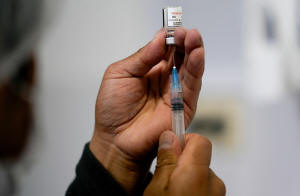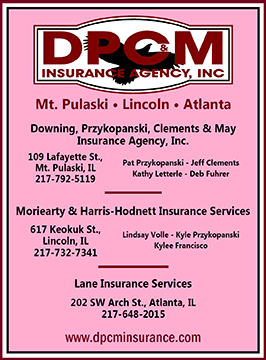Pfizer COVID-19 vaccine sales tumble after government guidance on the
shots narrows
[November 05, 2025]
By TOM MURPHY
The fall COVID-19 vaccine season is starting slowly for Pfizer, with
U.S. sales of its Comirnaty shots sinking 25% after federal regulators
narrowed recommendations on who should get them.
Approval of updated shots also came several weeks later than usual, and
Pfizer said Tuesday that hurt sales as well.
Many Americans get vaccinations in the fall, to protect against any
disease surges in the coming winter. Experts say interest in COVID-19
shots has been declining, and that trend could pick up this fall due to
anti-vaccine sentiment and confusion about whether the shots are
necessary.
The Centers for Disease Control and Prevention last month stopped
recommending COVID-19 shots for anyone, instead leaving the choice up to
patients. The government agency said it was adopting recommendations
made by advisers picked by U.S. Health Secretary Robert F. Kennedy Jr.
Before this year, U.S. health officials — following the advice of
infectious disease experts — recommended annual COVID-19 boosters for
all Americans ages 6 months and older. The idea was to update protection
as the coronavirus evolves.
But that sentiment started to shift earlier this year when Kennedy, who
has questioned the safety of COVID-19 vaccines, said they were no longer
recommended for healthy children and pregnant women.

Dr. Amesh Adalja said vaccine rates have been “suboptimal” in recent
years even for people considered a high risk for catching a bad case of
COVID-19.
“That’s only going to fall off more this season,” the senior scholar at
the Johns Hopkins Center for Health Security said recently.
The shifting guidance caused some confusion in September, once updated
shots began arriving at drugstores, the main place Americans go to get
vaccinated. Some locations required prescriptions or started asking
customers if they had a condition that made them susceptible to a bad
case of COVID-19.

[to top of second column]
|

A healthcare worker prepares a shot of the Pfizer COVID-19
vaccine in La Paz, Bolivia, Jan. 7, 2025. (AP Photo/Juan Karita,
File)
 The change in government guidance
also created questions about whether insurance coverage would
continue. A major industry group, America’s Health Insurance Plans,
has since clarified that its members will cover the shots.
CVS Health announced earlier this month that it will not require
prescriptions at its stores and clinics.
Pharmacy owner Theresa Tolle says this fall has probably been one of
the more confusing seasons for her customers. Tolle runs the
independent Bay Street Pharmacy in Sebastian, Florida.
She said her COVID-19 vaccine business has been busy because she has
an older patient population. Many still want the shots. But she’s
also had more customers tell her this year that they don’t want
them.
“There’s just so many messages out there, they don’t know who to
believe,” she said. “I’ve had people tell me they are afraid of it
when they’ve had it many times.”
Pfizer saw U.S. Comirnaty sales drop to $870 million in the recently
completed third quarter from $1.16 billion in the same time frame
last year. That came after vaccine sales rose the first two quarters
of the year.
Pfizer also said Tuesday that sales of its COVID-19 treatment,
Paxlovid, dropped more than 50% in the quarter both in the U.S. and
internationally due to lower infection rates.
Wall Street analysts also expect sales of the COVID-19 vaccine
Spikevax from Moderna to tumble about 50% in the third quarter,
according to the data firm FactSet.
Moderna will report its third-quarter results on Thursday.
All contents © copyright 2025 Associated Press. All rights reserved |